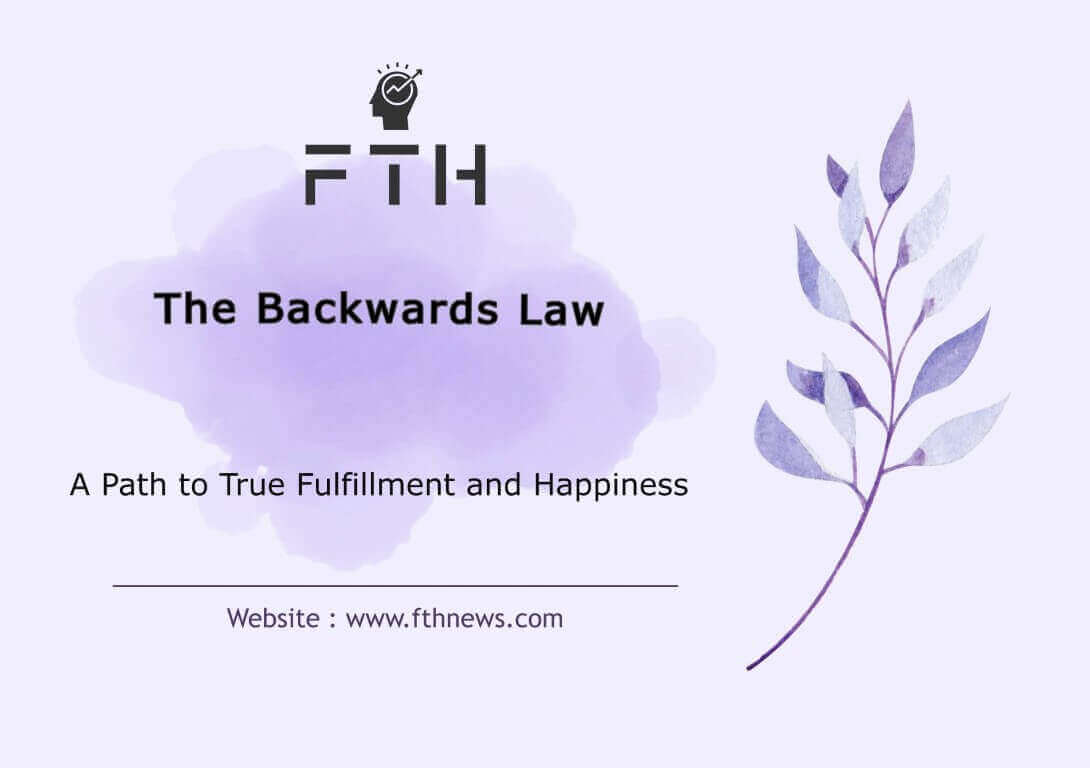
Have you ever found yourself striving so hard for a positive experience that the effort itself becomes a source of negative emotions? Conversely, have you ever noticed that accepting a negative experience can lead to unexpected positivity? This paradox is at the heart of what some call the “backwards law” – a concept that challenges our traditional understanding of success, happiness, and the path to achieving our goals.
Understanding the Backwards Law
The backwards law, as elucidated by philosopher Alan Watts, is a principle deeply rooted in Eastern philosophies such as Taoism and Zen Buddhism. At its core, the backwards law suggests that the more we strive for something, the more elusive it becomes. This idea is profoundly counterintuitive: the harder we chase after positive experiences, the more likely we are to encounter negative outcomes. Conversely, when we accept and embrace negative experiences, we often find that positive outcomes arise naturally.
Historical and Philosophical Context
Alan Watts, an influential thinker who introduced many Westerners to Eastern philosophical concepts, drew from a rich tapestry of ancient wisdom to explain the backwards law. In Taoism, there is a fundamental belief in the principle of “wu wei,” or effortless action, which posits that the best way to achieve our goals is through non-striving and natural alignment with the flow of life. Zen Buddhism similarly teaches the value of letting go of attachment and desires to find true peace and enlightenment.
The Counterintuitive Nature of the Backwards Law
This principle stands in stark contrast to the common advice we receive in Western societies, which often emphasizes hard work, determination, and relentless effort as the keys to success and happiness. From a young age, we are taught to set ambitious goals, work tirelessly to achieve them, and measure our worth by our accomplishments. However, the backwards law challenges this conventional wisdom by highlighting a paradox: the more desperately we pursue happiness and success, the further out of reach they become.
Psychological Insights
Modern psychology also provides support for the backwards law. Research on the paradox of hedonism, for example, indicates that the pursuit of happiness as an end goal often leads to feelings of dissatisfaction and unhappiness. This is because constantly striving for happiness creates pressure and sets unrealistic expectations, which can lead to disappointment when those expectations are not met.
Practical Applications
In practical terms, the backwards law encourages us to shift our focus from relentless striving to a more mindful and accepting approach to life. Instead of fixating on what we lack or desperately want, we are encouraged to acknowledge and accept our current experiences, even if they are uncomfortable or challenging. By doing so, we create a space for positive experiences to emerge organically, free from the stress and anxiety of constant striving.
Real-Life Examples
Consider the example of pursuing love: those who obsessively seek a romantic partner often find themselves feeling lonely and frustrated. However, when they shift their focus to self-discovery and personal growth, love often finds them in unexpected ways. Similarly, in the pursuit of wealth, individuals who constantly worry about becoming richer may never feel satisfied, regardless of their financial status. Those who focus on their passions and values, on the other hand, often find fulfillment and success as natural byproducts.
In essence, the backwards law invites us to rethink our approach to achieving goals and finding happiness. By embracing a mindset of acceptance and letting go of obsessive striving, we can align more closely with our true desires and experience a more profound sense of fulfillment and peace.
The Paradox of Desire and Attachment
Imagine you have set a goal to become a successful entrepreneur. You are committed to putting in a significant amount of effort to achieve this goal. However, this commitment also means that you are constantly aware of the gap between where you are and where you want to be. This persistent awareness can lead to negative emotions, such as anxiety, frustration, and a sense of inadequacy, which can significantly impact your well-being and self-esteem. The more you focus on the distance to your goal, the more it can seem like an insurmountable chasm, causing additional stress and frustration.
This phenomenon is rooted in the concept of desire and attachment. The more we desire something and become attached to the outcome, the more we suffer from the anxiety of not having it. This is because desire inherently creates a sense of lack—a gap between our current state and our desired state. The paradox lies in the fact that the harder we strive to bridge this gap, the wider it seems to become, leading to greater dissatisfaction.
Letting Go and Finding True Fulfillment
Alan Watts, an English writer and speaker, played a significant role in bringing Eastern philosophies to the Western world. He popularized the backwards law by explaining that the more you try to grab hold of something, the more it slips through your fingers. This principle applies not only to material wealth but to all aspects of life, including personal fulfillment, relationships, and inner peace.
Embracing Non-Striving
Watts encouraged people to stop trying so hard to achieve superficial goals and instead focus on what they truly want out of life. He emphasized that our society often misleads us into believing that relentless effort and constant striving are the keys to happiness and success. In reality, this obsessive pursuit can lead to burnout, frustration, and a perpetual sense of inadequacy.
Instead, Watts advocated for a more relaxed and introspective approach. By letting go of the need to control and force outcomes, we open ourselves up to the natural flow of life. This doesn’t mean giving up on our goals, but rather understanding them more deeply and aligning our actions with our authentic desires.
Defining True Desires
A critical aspect of Watts’ philosophy is the notion that many of us don’t actually know what we truly want. We are often driven by societal expectations, external pressures, and superficial desires. Watts argued that to find true fulfillment, we must take the time to explore and define our genuine desires. This process involves introspection and self-awareness, allowing us to differentiate between what we think we should want and what we genuinely crave at a deeper level.
Redirecting Energy
The backwards law suggests redirecting our energy from frantic striving towards mindful pursuit. This involves embracing patience and allowing ourselves to be guided by our inner wisdom rather than external metrics of success. By focusing on the journey rather than the destination, we can find joy and satisfaction in the present moment.
For example, in the realm of career ambitions, instead of obsessing over climbing the corporate ladder, one might find greater fulfillment in pursuing work that is meaningful and aligns with personal values. This shift in perspective can lead to a more balanced and contented life.
Real-Life Applications
- Personal Growth: Instead of striving to become a “better” person based on external standards, focus on self-discovery and acceptance. Embrace your strengths and weaknesses, and grow in ways that feel authentic to you.
- Relationships: Let go of the pressure to find the “perfect” partner. Instead, invest in building meaningful connections and understanding your own needs and desires in a relationship.
- Financial Goals: Rather than fixating on accumulating wealth, explore what financial security means to you personally. Focus on creating a balanced life where financial goals support, rather than dominate, your overall well-being.
Alan Watts’ teachings on the backwards law offer a profound shift in how we approach our goals and desires. By letting go of the need to control and striving less for superficial achievements, we can find true fulfillment. This involves a deep understanding of our authentic desires and a mindful, patient approach to pursuing them. Embracing the backwards law allows us to experience life more fully, finding peace and contentment in the present moment and aligning our actions with our true selves.
Cultivating Self-Awareness and Aligning with Your Core Values
The principle of the backwards law can help us delve deeper into our desires and motivations. It encourages us to turn our attention inward and critically examine our innermost desires. By doing so, we can gain a better understanding of our true needs and make more informed decisions.
This introspection involves questioning why we want something, what we expect to gain from it, and whether it aligns with our core values and beliefs. For example, the pursuit of happiness through constant seeking can be counterproductive. The common belief is that happiness is attainable only through the achievement of specific goals. However, this perpetual seeking often leads to lower levels of happiness compared to simply letting go and experiencing happiness without any particular motive.
Embracing Uncertainty and Cultivating Presence
Another aspect of the backwards law is its relationship to anxiety. Anxiety is often triggered by our attempts to exert control over our surroundings. We tend to impose our will on our emotions and external environment, which only heightens our anxiety. By relinquishing control, we can cultivate self-acceptance and move closer to attaining peace of mind.
The backwards law also applies to the pursuit of wealth. Constantly reminding yourself that you want to be rich can make you feel poorer, regardless of how much money you actually have. True wealth is a mental state that comes from within, rather than a specific amount of money in your bank account.
When it comes to love, shifting our focus from chasing love to self-discovery can create an environment where love flows towards us naturally. Knowing ourselves and our core values helps us identify the specific type of love that aligns with our needs and desires. This self-awareness allows us to attract relationships that are more fulfilling and meaningful.
Balancing Desire and Imagination for Optimal Results
The effective alignment of desire and imagination is crucial for achieving optimal results. Excessive focus solely on desire can impede progress. Intense fixation on a future destination may lead to neglecting the use of imagination in visualizing the process required to reach that goal.
Distinguishing between wanting and genuinely believing in the possibility of achieving a goal is paramount to leveraging the law of reversed effort successfully. Desires and imagination must be harmoniously synchronized. While diligent effort and perseverance are commendable, the lack of belief or an inability to envision oneself accomplishing the desired outcome may impede success.
Overcoming Anticipatory Anxiety and Embracing the Flow State
Being present is a concept emphasized by many spiritual traditions. Buddha’s teaching, “Do not dwell in the past, do not dream of the future, concentrate the mind on the present moment,” highlights the importance of living in the now. Anticipatory anxiety, which occurs when we face situations that are unfamiliar or uncertain, can be a significant source of stress.
This anxiety may manifest as physical symptoms like sweating, shaking, or increased heart rate, as well as negative thoughts such as fear, doubt, or insecurity. Managing anticipatory anxiety often requires relinquishing conscious control, which can be daunting. However, with strategies like mindfulness, cognitive-behavioral therapy, or relaxation techniques, it is possible to overcome anticipatory anxiety and improve overall mental well-being.
To achieve a better balance between conscious and subconscious decision-making, it’s helpful to reframe our perspective. Instead of viewing challenges and obstacles as threats, we should see them as opportunities for personal growth and learning. This mindset shift allows us to cultivate the optimal conditions for intuitive and subconscious processes to guide our actions.
Over time, we can train ourselves to make decisions subconsciously, leading to a more natural and intuitive decision-making process. This is similar to the way we learn to drive, where our brains get used to the motions, and it becomes a subconscious activity. This same process can apply to other activities, allowing us to enter a state of flow where our actions happen effortlessly.
Embracing the Present Moment and Finding True Fulfillment
Seneca, the Roman philosopher, offered valuable insights into happiness and presence. He stated, “True happiness is to enjoy the present without anxious dependence upon the future.” This wisdom reminds us that the more we try to cling to something, the more it will slip away. When we learn to let go and stop obsessing over having control, we can start being fully present in the moment.
Being present allows us to focus on the things right in front of us, improving the quality of time we spend with loved ones and helping our bodies and minds feel more rested and focused. Living fully in the present makes us more mindful of our thoughts, actions, and surroundings. This heightened awareness helps us understand our strengths and weaknesses and identify areas for improvement. With this newfound self-awareness, we can set and achieve our goals more effectively.
How to Practice the Backwards Law
Practicing the backwards law involves embracing a counterintuitive approach to achieving goals and finding happiness. Instead of relentlessly striving and clinging to outcomes, the backwards law encourages acceptance, letting go, and aligning with the natural flow of life. Here are some practical steps to help you incorporate this philosophy into your daily life:
1. Embrace Acceptance
Mindfulness Meditation: Practicing mindfulness meditation helps you stay present and accept each moment as it is. By focusing on your breath and observing your thoughts without judgment, you can cultivate a sense of acceptance and reduce anxiety about the future.
Acceptance of Negative Emotions: Instead of resisting or avoiding negative emotions, acknowledge and accept them. Understand that they are a natural part of the human experience and can provide valuable insights into your inner self.
2. Let Go of Attachment
Detachment Practices: Practice detachment by regularly reflecting on your goals and desires. Ask yourself whether your attachments are serving your true needs or simply creating stress. Letting go of unnecessary attachments can help you find inner peace.
Minimalism: Adopting a minimalist lifestyle can help reduce the clutter in your life, both physically and mentally. By focusing on what truly matters, you can let go of material possessions and superficial desires that don’t contribute to your well-being.
3. Focus on the Journey
Process-Oriented Goals: Shift your focus from outcome-oriented goals to process-oriented ones. For example, instead of aiming to lose a certain amount of weight, focus on adopting healthy eating habits and enjoying physical activity.
Celebrate Small Wins: Recognize and celebrate small achievements along the way. This helps you appreciate the journey and stay motivated without becoming obsessed with the end result.
4. Cultivate Self-Awareness
Regular Self-Reflection: Set aside time for regular self-reflection. Journaling can be a helpful tool to explore your thoughts, feelings, and desires. Understanding your true motivations allows you to align your actions with your core values.
Seek Feedback: Engage with trusted friends or mentors who can provide honest feedback about your pursuits. They can offer valuable perspectives and help you stay grounded.
5. Balance Effort and Surrender
Effortless Action (Wu Wei): Embrace the Taoist concept of “wu wei” or effortless action. This involves taking action without force or struggle. Trust that things will unfold naturally when you align your actions with the flow of life.
Mindful Surrender: Practice mindful surrender by letting go of the need to control every outcome. Understand that some things are beyond your control and that surrendering can lead to unexpected positive results.
6. Reframe Challenges
Growth Mindset: Adopt a growth mindset by viewing challenges and failures as opportunities for learning and growth. This perspective helps you stay resilient and reduces the fear of making mistakes.
Positive Reframing: Reframe negative situations by finding positive aspects or lessons within them. This practice can help you accept and move through difficult experiences with greater ease.
7. Engage in Activities that Promote Flow
Find Your Flow State: Engage in activities that naturally absorb your attention and bring you into a state of flow. This can be anything from a hobby you love to work that you find fulfilling. Being in flow helps you lose track of time and reduces the pressure of striving.
Balance Challenge and Skill: Choose activities that balance your skill level with the challenge they present. This balance is key to experiencing flow and enjoying the process without excessive striving.
Conclusion: Embracing the Backwards Law for a Fulfilling Life
The backwards law challenges us to rethink our approach to goals, happiness, and success. It encourages us to accept negative experiences as a pathway to positive outcomes and to let go of the obsessive striving that often leads to dissatisfaction. By turning our attention inward and examining our true desires, we can align our actions with our core values and beliefs, leading to a more fulfilling and balanced life.
Embracing the philosophy of the backwards law is not about giving up on our goals, but about understanding the deeper motivations behind them and finding a balance between effort and acceptance. By doing so, we can create a life that is rich in meaning and purpose, guided by our true desires and not by the endless pursuit of superficial achievements. Embracing this philosophy can help us find peace, happiness, and fulfillment in the present moment, leading to a more content and balanced existence.














